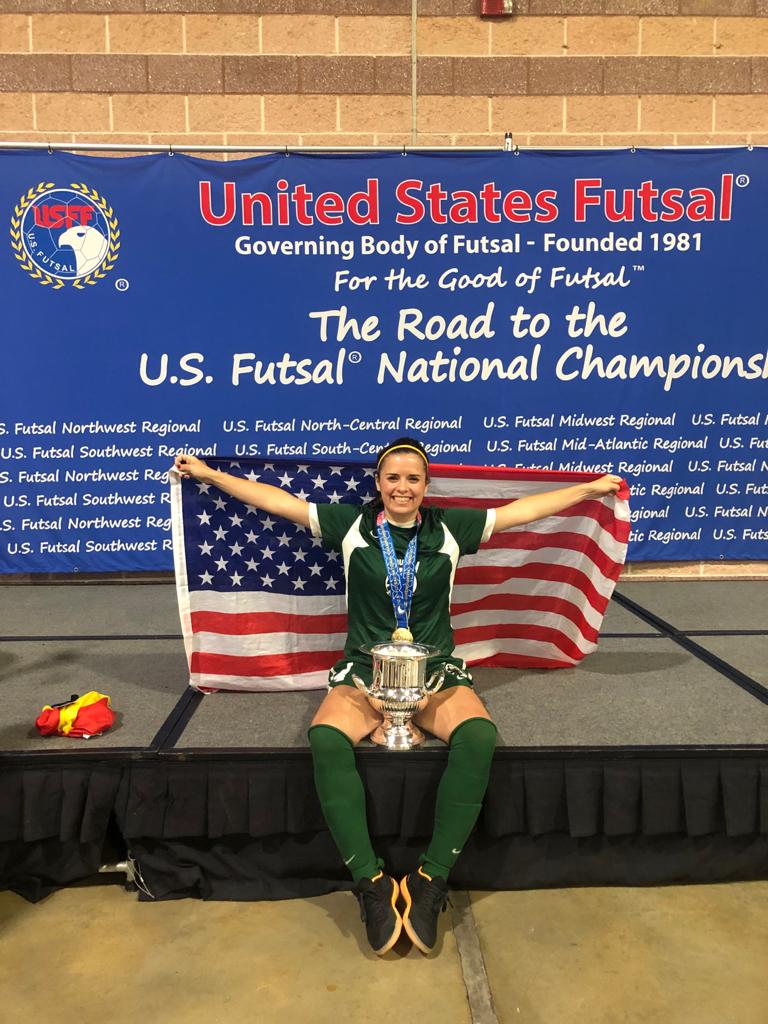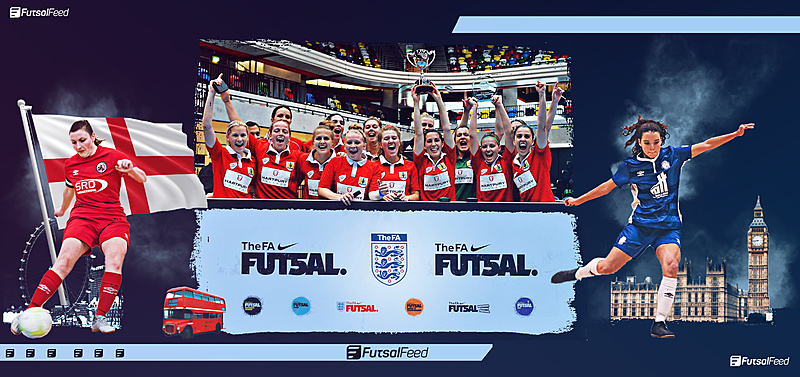Marta Pelegrín González is a Spanish professional futsal player competing in the Primera División Femenina de Futsal (first division of women’s futsal) in Spain for Roldán FSF in the Murcia region. She won multiple Spanish titles during her time playing for Futsi Atlético Madrid, along with European and World Club Championships. This illustrious run was followed by a period in the USA, where yet more trophies were added to the collection.
Marta and I were first connected a couple of years ago through a mutual friend of ours, Fran Rodríguez - a talented graphic designer who works for our media team at Manchester Futsal Club.
Spain has always been held up as an example to other nations of how to grow and develop futsal. Boasting arguably the strongest men’s domestic league in the world, Spain also has strong women’s leagues with many players forging professional careers.
Marta has kindly agreed to give us some insight into her career, women’s futsal in Spain generally, and the lessons that other countries can learn about how to develop the sport for women and girls.

Thank you so much for joining us, Marta! Please could you tell us a little about your futsal journey and how you first got involved in the sport? Had you always wanted to be a professional futsal player growing up?
MP: I started to play futsal when I was 8 years old. I used to ask my mom almost every day, "I want to play soccer, please?” because I started playing different sports than soccer when I was a little girl. I started to play futsal with boys at school first and I really liked it - that helped me develop my skills really fast. One day a school friend told me that she was going to try out for a futsal team for girls and she invited me to go with her and I accepted. I was lucky enough to have in my town a team for girls only that I could practice and play tournaments, not every girl in the world used to have this opportunity 20 years ago because it wasn't popular like it is these days.
A lot of people ask me if I started to play soccer first but actually I started to play futsal and I have loved this sport since day one. I can remember that I started in a youth girl’s team with older girls. It was very challenging for me because they were stronger and faster but I never gave up. Also, I remember that I couldn't compete because I needed to be older so I only could train and not play in real games. Later when I was 12 years old I changed to another club and finally I could play and compete with girls of the same age.
In that club called UCAM Murcia, there was a women's professional futsal team in the first division in Spain. I was always watching them every single practice and game to learn from them and always I wanted to be like them one day.
You have won many titles during your career, including World Club Championships, European Championships and League and Cup competitions in both Spain and the USA. Who are some of the toughest teams and players you have faced?
MP: I think one of the best leagues in the world is the Spanish league since they are very organized with 10 months of competition a year long and have got some of the best players from Spain, Brazil and Portugal - so every weekend I'm competing with the best quality of players.
But I was impressed with Brazil; the level is really high. I played against 3 teams there and every single one was amazing. One of the games was the World Club Championship against Leoas da Serra, which Amandinha - the Best Female Player in the World for the last 7 years - played in, and it was an environment that I never saw in my life with 9,000 fans in the stadium, absolutely a beautiful experience.
In the U.S.A, futsal is growing slowly but they have a lot of support and potential to be one of the best in the future if the investment and visibility are there, but for now the characteristics of players are soccer players naturally and not only futsal, so they are physically stronger with a lot of contact but less skilful in reduced space in futsal. I really believe in the next five years we can see a big change in futsal in the U.S for the better.
So in my opinion the best clubs in the World are Futsi Atlético Madrid, Burela and Roldan from Spain. Leoas da Serra and Taboao Magnus from Brazil and Benfica from Portugal.
I also played for 5 years in Futsi Atlético Madrid, which is a mix of players from Spain and Brazil's national team’s. In my opinion, they are among the best players so every single training was a challenge. Some of the practices were so tough that it was harder than some of the games and that's what made us so strong and focused. Madrid with those players won every tournament and cup in Spain and the world. It was beautiful to be a part of something so special where I learned a lot.
Nowadays I could say I consider the best players Amandinha, Ju Delgado and Ari from Brazil; Anita Lujan and Leti from Spain.

The pandemic has brought a lot of uncertainty to the sporting world. As a professional athlete, it must have been reassuring when the Spanish Football Federation (RFEF) reiterated its commitment to women’s futsal clubs by pledging 2 million euros over the next four seasons. How do you feel about the future of women’s and girls’ futsal in Spain? Are you confident it will continue to grow?
MP: The Spanish Football Federation is helping financially to grow futsal and we are grateful but it's growing slow - we need to continue fighting for more visibility with sponsors. Sports in general with a bigger economic power were affected with the pandemic so futsal was much more affected because it's played on inside courts, the sport has less help than others financially and also it's not popular enough to survive crises like this especially without fans being able to come and watch games. When we were able to play again without fans attending games, most of the Clubs in Spain got creative and launched their own YouTube channel to broadcast their home games and this is very important for people to follow teams they like, learn more players they admire and see some great quality players facing each other. Kids absolutely love watching professional players and every little kid's dream starts with following their idols' steps.
I feel that we need time to recover still but futsal is a sport that catches your attention and is growing its popularity. I believe that everything is going to normalize soon and we can continue to work to grow even more worldwide for future generations.
Spain is one of the more advanced futsal nations. What lessons do you think other countries can learn when trying to develop the sport?
MP: In my opinion, like I said, futsal is a sport that will catch your attention from the beginning because it is fast paced and a lot going on with many goals and beautiful plays happening all the time. Spain is very organized with their Calendar and always the games are on TV so people can watch and enjoy games. This is something that other countries need to do as well to make the sport more visible and appealing to people who don't know the sport very well. I'm sure if the Federations and Authorities in other countries support more and create competitive/recreational leagues and tournaments for kids and adults to play, many players would participate much more and talents are created naturally. We need support from people who really love this sport because in many countries the issue is that they treat futsal like soccer and it's a different sport. Futsal is always fighting to be considered an Olympic sport and this would be a game changer for all of us. It would get the attention it deserves, the money necessary and sponsors to make the sports bigger and attractive to everyone who invests in it. In my opinion, all the countries that have futsal should unite their powers and work together to make the sport an Olympic sport so TV can broadcast big games and it attracts more kids and countries.

What advice would you give to any young female players reading this who might like to be a professional futsal player in the future?
MP: You need to work a little bit everyday on your technical skills and movement in a reduced space. You need to be able to improvise when you don't have another option, think faster to get out of difficult situations that the game can put you in. Only practicing two or three days a week with your team won't get you to the highest level, you need to put extra work in to be a professional player. If you have a ball, a wall and a couple of cones...you can develop amazing skills training by yourself in your own house. The sooner you start having a competitive mindset, the faster you'll feel confident for more challenges.
The best players in the world like Messi, Cristiano Ronaldo and Ronaldinho started playing futsal and then transitioned to soccer. It's where you really develop your best skills to be a complete player at the highest level. So always follow your dreams and give your 100% as this sport is rewarding. The passion always moves you, and if you get to a point where futsal is not really recognised in your country and you have what it takes to be a professional futsal player, then it's probably the time to consider finding a country where they play futsal at the highest level with competitive leagues and continue to work to get your opportunity and show what you are capable of - but never give up, keep fighting!
Follow Marta on Instagram @martapelegrin2 and Twitter @MartaPelegrin2
>>> 4+1 easy ways how can you support FutsalFeed






